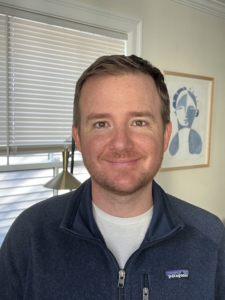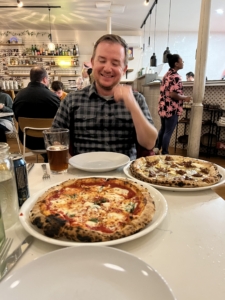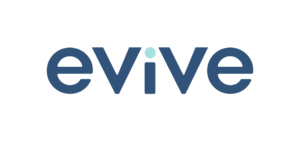Every Story Matters: Sam
Trigger Warning: The following content contains descriptions of gambling, gambling elements, and addiction, which may be distressing for some individuals.
Sam DeMello is the founder of Evive and is in recovery from a gambling addiction. Sam sat down with NCPG to share his experience with problem gambling as part of Problem Gambling Awareness Month (PGAM). This year’s theme, “Every Story Matters,” is a testament to both the power and vulnerability of sharing one’s experience with problem gambling.
| NCPG: Hi Sam, thank you for joining us. Can you please introduce yourself and tell us a little bit about yourself?
Sam: My name is Sam DeMello, I’m 37. I grew up in the Bay Area and now I live in Boston with my wife and two kids. I’ve worked as a recruiter in the tech and the biotech space for most of my career. I love getting to talk to people that are way smarter than me all the time and helping companies grow. NCPG: We’re chatting today during Problem Gambling Awareness Month, and you had reached out and wanted to share a little bit about your story. Can you share how gambling has impacted your life? |
 Photo courtesy of Sam DeMello |
Sam: I’ve struggled with a severe gambling addiction for most of my life. I started gambling when I was 13. I was a child of the poker boom. I started playing cards with my friends through middle and high school, and then I got serious about it in college. I was an okay poker player. I probably won more than I lost. But I had some problematic tendencies.
I would spend more time thinking about poker or playing poker than I did going to class, but I did manage to graduate from college. Then when I was 24, I discovered sports betting.
NCPG: What was different about sports betting?
Sam: It was the first time that I gambled online and on sports. I experienced having a casino in my pocket 24 hours a day. And very quickly, it just got totally out of control. I went from, hey, this is something that I can do with my friends to gambling by myself on sports that I didn’t know anything about. I was at my office gambling on my computer or sneaking off to the bathroom to place bets. Gambling on my phone also let me engage in other gambling activities that I wouldn’t do in a traditional casino, like playing blackjack or slot machines.
NCPG: At the time were you able to identify that some of those behaviors might indicate a problem?
Sam: I didn’t really know what gambling addiction was. I thought that a gambling addict was someone who was broke and in debt and spending their life at the horse track. But I wasn’t those things. I was successful and doing well at work, I had friends and a social life. I considered myself successful, and I didn’t think you could be both an addict, and successful.
NCPG: What prompted you to seek out treatment?
Sam: I can’t recall the exact gambling experience that pushed me to seek treatment for the first time, but I’m sure it involved losing control and losing a lot of money in a particular gambling session. The next day, I essentially woke up and said, okay, I need to do something. I need to change this.
I finally bit the bullet and went to a therapist that listed gambling addiction as one of their areas of focus. I said, hey, I have this bad gambling habit. I can’t seem to stop or control myself.
The therapist immediately wanted to dig into my childhood to identify the roots of my issue, and I wasn’t ready for that. I was a middle-class kid with two super loving parents. I’m well educated, I went to college. I’ve had every advantage in the world. I didn’t feel like there was this big set of trauma in my life I was trying to escape.
It was like I walked into the hospital with this big head wound, and I was like, I’m bleeding. I can’t stop! And they were like, well, let’s check other parts of your body…I didn’t want that, I just wanted to stop the bleeding. One thing that was impactful was they recommended that I go to a Gamblers Anonymous meeting. Which I eventually did.
NCPG: How was that experience?
Sam: I waited until I was out of state to go to a meeting for the first time. I was too scared to go in my hometown because I was terrified someone would see me. I walked into the room, and I said, My name is Sam and I’m a compulsive gambler. It was the first time I had said that out loud to a room full of people. I told a little bit of my story. Probably not the super gory details of what was actually happening, but enough in my mind.
I was the youngest person in that room by a substantial margin. And when I looked around and I heard other people’s stories, I felt like they didn’t understand me. They were talking about sitting in front of the video poker machine at the casino or skipping work to go to the horse track. I was gambling with cryptocurrency on my phone at work at my tech job.
In retrospect, I was immature and not ready to accept certain realities about myself and I definitely should have worked harder to connect with that group of people, or found myself a group that I did connect with. Now I understand the value of peer support, but at the time I wasn’t ready for it or capable of accepting it.
NCPG: Was there another route to recovery that was a better fit for you?
Sam: Around that time, I met a wonderful woman and I fell in love. We dated for a couple years, and I kept my gambling, and my attempt to stop a secret. I eventually proposed to her, and she said yes. By that point unfortunately, the wheels were really coming off the bus. I couldn’t maintain all the energy I was putting into hiding my addiction. She saw the symptoms of my gambling, the secretiveness, the stress, my general distance… A couple months into our engagement, she basically gave me an ultimatum and said, OK — either you tell me what’s going on and we can try to address it, or we’re not going to get married.
It was very, very clear to me at that point that I was out of control and that gambling was ruining my life. I knew that if I didn’t stop, I was going to lose these things that I really wanted, and more importantly needed, like this incredible partner for the rest of my life.
So I bit the bullet, and I opened up to her. In fact, she was the first person in my life that I really opened up to.
I am incredibly fortunate. She was very supportive, way more than I felt I deserved. She took a leap of faith that I really was the person that she thought I was, and that the stuff that she didn’t like about how I was acting were outcomes of my addiction.
We set out together to help me get sober together, and it was a lot of work. I educated myself, and she educated herself a lot about what gambling addiction is. I gave up financial control to her, implemented blocking software on my phone, and signed up for self-exclusion.
One of the things that really helped me was learning about the neuroscience behind gambling. I was really stuck in this cycle of shame for not being able to control this thing that I felt like I should be able to control. Understanding that there was a chemical component of what was happening in my brain when I gambled really allowed me to see my experience in a bit of a different way.
This was in early 2020 and I think I also benefited from everything stopping around COVID. It just gave me this forced pause to stop and think. I wasn’t working, the world kind of stopped, and I just had this moment to detox and reset.
NCPG: How has that family support made a difference in your recovery?
Sam: I can’t emphasize enough how isolating it feels to have a gambling addiction. Because it’s so silent, and it’s so easy to hide from the world. I lost a lot of my self-worth and felt terribly ashamed of who I was.
 Photo courtesy of Sam DeMello |
I’ve always performed better on a team than I have individually. I think what kept me gambling for a long time, outside of my addiction to it, was this real strong sense of accountability. I got myself into this mess. I’m going to get myself out of this mess.
I felt like I didn’t deserve support. I felt like I should be able to fix it on my own. I wanted the tools and the resources to fix it on my own. I had unsuccessful early experiences with therapy and peer support, and unfortunately didn’t find that sense of connection to others at that time. But as soon as somebody I cared about knew what was going on with me, and started the process of forgiving me, it allowed me to start that process for myself. It gave me hope that I could really fix this. I think it gave me hope for the first time in a very long time. |
NCPG: Can you share a bit about your app, Evive?
Sam: At the beginning of last year, like many people in the tech industry I was laid off from my job. I knew from my own recovery that if I’m bored, bad things tend to happen. I needed to put my energy into something.
I had been in recovery for about three years at that point, and I was feeling solid. For the first time, I thought maybe I can use this time to give back to others who are struggling with problem gambling. I didn’t know how to do that, so I started to do some research, and I got completely sucked into this rabbit hole.
I started learning about what kind of support and funding exist today in the United States for somebody that’s experiencing a gambling problem or gambling harm. I started looking at some of the challenges around access to care, the types of treatment that exist, and based on my own professional experience I started looking into how companies were applying technology to try and help.
I developed this idea that there was a real need to build a digital health tool for the problem gambling community, similar to apps I had become familiar with for alcohol consumption, dieting and exercise, and opioid addiction. Over the last year, I embarked on a journey to build it. I founded a company called Evive and have assembled an incredible group of people to bring the idea to life. One of the most exciting members of our team is Dr. Jeff Marotta, whose work I came across through my own research, and has taught me so much about problem gambling.
I don’t believe there is one way to recover from or prevent gambling harm. I believe everyone’s journey is as unique as they are. Evive is about meeting people where they are, helping them better understand their own relationship with gambling, and then supporting them in building a healthier relationship for them. For someone like me, that means not gambling at all. For others, that may mean gambling in a more intentional way, with a big safety net and support system in case they start to experience harm.
In addition to the app itself, our goal was to build a supportive community that gave our members the ability to connect with others who have shared lived experiences and similar goals.
Today, you can download Evive from the iOS or Google Play App stores. You can also join the community for free from our website, www.getevive.app.
NCPG: What are you optimistic about for the future?
Sam: I cannot tell you how different my life is in recovery. I have two young children, so my life right now is busy, and sometimes stressful. But even on my worst days, I am so much calmer and capable of dealing with the stress than I ever felt when I was gambling. More than that, I feel incredibly present in my life. I feel like I’m there for my family when they need me, and they are there to support me in my own recovery.
My goal is to keep getting one percent better every day. It’s life changing. I’m doing what I want to be doing. I’m living how I want to be living. My biggest goal right now is to find a way that I can devote more time to what we’re building at Evive, and continue giving back to the community.
NCPG: Thank you so much. And thank you for sharing your story with us.
If you or someone you know may have a gambling problem, contact the National Problem Gambling Helpline, which offers hope and help without stigma or shame. Call 1-800-GAMBLER, text 800GAM, or visit www.1800gamblerchat.org. Help is available 24/7 – it is free and confidential. |
|
 |
Evive is an evidence-based platform that empowers individuals to develop a more mindful and intentional relationship with gambling. Without pressure or judgment, Evive helps its members live a life free from the harmful effects of gambling by combining best in-class tools, comprehensive educational modules, and a supportive community of like-minded individuals– all in an easy-to-use smartphone app. Your journey is individual, but at Evive, you’re not alone. To learn more, visit www.getevive.app. |
